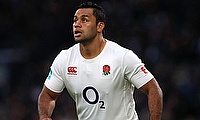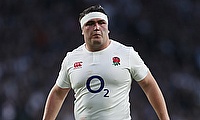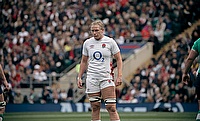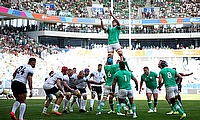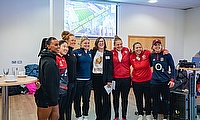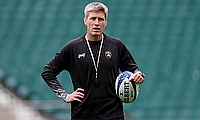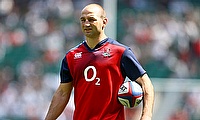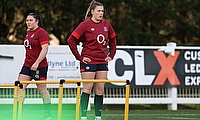Eddie Jones – England players have to ‘work out on the field how to help the referee’

Eddie Jones says that his players have to 'work out on the field how to help the referee'
©PA
Prior to playing Argentina this weekend, Eddie Jones believes that his players have to “work out on the field how to help the referee”.
In the past, Jones has been critical of officials, saying there should be two referees on the field at all times and even implied that those in the middle attempt to “help” teams that have received a red card.
Since the 2019 Rugby World Cup, no other referee has taken charge of England on more occasions than Andrew Brace and the Irishman will be in the forefront of Jones’ thoughts again this weekend as he takes charge of Sunday’s fixture.
With Owen Farrell reinstalled as captain and vice-captains in the form of Ellis Genge and Jack Nowell, there are three names to choose from when it comes to who will be communicating with the officials.
Asked who that communicator might be, Jones’ response is that “the players will work it out on the field”, so you’ll probably have to wait until Sunday to work out exactly who it will be.
“It’s understanding what the referee wants,” Jones, when asked on how his players have been preparing to communicate with referees, said. “He’s got a certain game plan. We understand how referees think now – they don’t want to have pre-game meetings anymore. That’s stopped, and they want to go in with a focus on their game plan.
“The referees have changed a lot. They now have a very focussed game plan of what they want to achieve, and we’ve got to help them achieve that. The players have got to work out on the field how to help the referee.”
England’s leadership will be the most important thing in how they go about communicating with Andrew Brace this weekend, Jones citing the referee’s recent record as a catalyst for this greater need for communication from the senior players.
“Look at how the game is evolving,” Jones said. “Brace averages 2.1 yellow cards per game, so the chance of there being two yellow cards is pretty high on Sunday. The edict from World Rugby has come out really strongly about protecting the poacher, so the number of yellow and red cards could increase.
“He [Brace] is only averaging 0.5 red cards [per game]. So, the chances of odd-numbered teams playing on the field on Sunday is pretty high.
“Therefore, your leadership needs to be able to adapt. Now more than ever. Once the whistle goes we [coaches] have very little input because you can’t get messages on the field.
“There’s only an opportunity during the water break at the 20-minte mark, so the players have to adapt to the game.
“We don’t know what form the game will take and that’s the opportunity. We want to be at the forefront of that. Our target is to be at our best at the World Cup, but each game is an opportunity to improve, and I’m delighted by the way the players have responded.”
When it comes to “protecting the poacher” and the “edict” from World Rugby that jones spoke of, last weekend offered two examples where the end result differed. One such event happened in Tokyo where Brodie Retallick saw red and against Scotland, Glen Young saw yellow for a similar looking clear-out.
“We’ve done a little bit of practice on that, identifying the area we need to go in at that situation,” Jones said.
“It’s a game of fine margins, isn’t it? Retallick goes in with all the best intention, he’s 6ft 8in, gets in good body position and is slightly off.
“No one is debating that’s not right, but it’s difficult for the players. We’ve had a little think about how we approach it. In the heat of the moment when they’re trying to clear someone, it’s difficult.”
England starting XV: Freddie Steward; Jack Nowell (VC), Manu Tuilagi, Owen Farrell (C), Joe Cokanasiga; Marcus Smith, Ben Youngs; Ellis Genge (VC), Luke Cowan-Dickie, Kyle Sinckler, Alex Coles, Jonny Hill, Maro Itoje, Tom Curry, Billy Vunipola
Replacements: Jack Singleton, Mako Vunipola, Joe Heyes, David Ribbans, Sam Simmonds, Jack Willis, Jack van Poortvliet, Henry Slade


